Related Research Articles

Benjamin Chew was a fifth-generation American, a Quaker-born legal scholar, a prominent and successful Philadelphia lawyer, head of the Pennsylvania Judiciary System under both Colony and Commonwealth, and Chief Justice of the Supreme Court of the Province of Pennsylvania. Chew was well known for his precision and brevity in making legal arguments as well as his excellent memory, judgment, and knowledge of statutory law. His primary allegiance was to the supremacy of law and constitution.

The Middle Colonies were a subset of the Thirteen Colonies in British America, located between the New England Colonies and the Southern Colonies. Along with the Chesapeake Colonies, this area now roughly makes up the Mid-Atlantic states.

The Province of Pennsylvania, also known as the Pennsylvania Colony, was a British North American colony founded by William Penn after receiving a land grant from Charles II of England in 1681. The name Pennsylvania refers to William's father, Admiral Sir William Penn.

John Penn was the last governor of colonial Pennsylvania, serving in that office from 1763 to 1771 and from 1773 to 1776. Educated in Britain and Switzerland, he was also one of the Penn family proprietors of the Province of Pennsylvania from 1771 until 1776, holding a one-fourth share, when the creation of the independent Commonwealth of Pennsylvania during the American Revolution removed the Penn family from power.
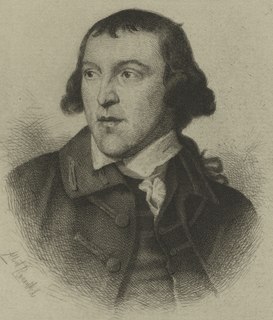
Andrew Allen was a lawyer and official from the Province of Pennsylvania. Born into an influential family, Allen initially favored the colonial cause in the American Revolution, and represented Pennsylvania in the Second Continental Congress from 1775 to 1776. Like many other wealthy elites in Pennsylvania, however, he resisted radical change, and became a Loyalist after the Declaration of Independence and the Pennsylvania Constitution of 1776.

Joseph Galloway was an American attorney and a leading political figure in the events immediately preceding the founding of the United States in the late 1700s. As a staunch opponent of American independence, he would become one of the most prominent Loyalists in North America during the early part of the Revolutionary War.
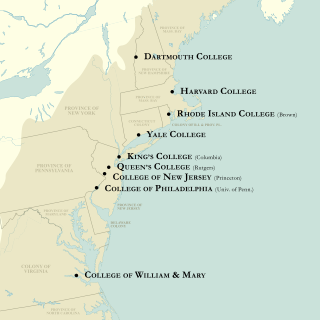
The colonial colleges are nine institutions of higher education chartered in the Thirteen Colonies before the United States of America became a sovereign nation after the American Revolution. These nine have long been considered together, notably since the survey of their origins in the 1907 The Cambridge History of English and American Literature.

Andrew Hamilton was a Scottish lawyer in the Thirteen Colonies, where he finally settled in Philadelphia. He was best known for his legal victory on behalf of the printer and newspaper publisher John Peter Zenger. His involvement with the 1735 decision in New York helped to establish that truth is a defense to an accusation of libel. His eloquent defense concluded with saying that the press has "a liberty both of exposing and opposing tyrannical power by speaking and writing truth."
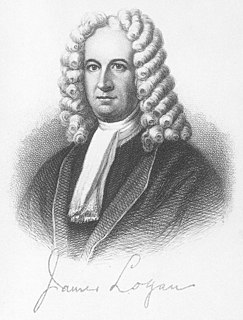
James Logan was a Scots-Irish colonial American statesman, administrator, and scholar who served as the fourteenth mayor of Philadelphia and held a number of other public offices.
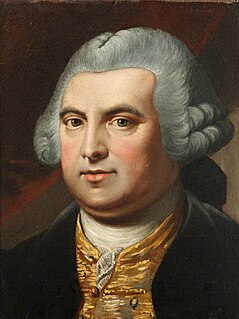
James Hamilton, son of the well-known American lawyer Andrew Hamilton, was a prominent lawyer and governmental figure in colonial Philadelphia and Pennsylvania. He served as Deputy Governor of the Province from 1748 to 1754, and again from 1759 to 1763.

Isaac Norris was a merchant, slave trader and prominent figure in provincial Pennsylvania, including mayor of Philadelphia in 1724.
Isaac Norris was a merchant and statesman in provincial Pennsylvania.
The Philadelphia Election Riot in 1742 was a riot that occurred due to political disagreements among the constituents of the increasingly diverse population in the city. Politics in Pennsylvania, including Philadelphia, had long been dominated by the Quakers but, with their political dominance increasingly threatened by the predominantly Anglican Proprietary Party, tensions grew in the city. The Quakers and Anglicans were predominantly led by Isaac Norris II and William Allen, both of whom were well respected and held significant political power. In an attempt to swing the vote, the Proprietary Party "hired armed sailors" to disrupt the Quakers who, in their own attempt, were bringing "unnaturalized Germans from the country to vote." On voting day, October 1, 1742, violence broke out between the two sides.

Richard Penn Sr. was a proprietary and titular governor of the province of Pennsylvania and the counties of New Castle, Kent, and Sussex on the Delaware River from 1746 to 1771. His father was Founder of Pennsylvania William Penn.
John Penn was a proprietor of the colonial Province of Pennsylvania. He was the eldest son of the colony's founder, William Penn (1644–1718), by his second wife, Hannah Callowhill Penn (1671–1726). Since he was the only one of Penn's children to be born in the New World, the Americas, he was called "the American" by his family.
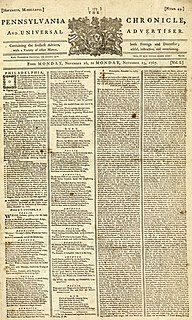
The Pennsylvania Chronicle and Universal Advertiser was an American colonial newspaper founded in 1767 that was published in Philadelphia, Pennsylvania, prior to the American Revolution and was founded by William Goddard and his business partners Joseph Galloway and Thomas Wharton. Benjamin Franklin, an associate of Galloway, was also a partner with the Chronicle.
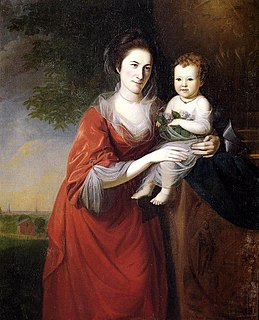
Mary "Polly" Norris Dickinson was an early American land and estate owner and manager. She is known for her ownership of one of the largest libraries in the American colonies, her participation in political thought of the time, and her presence in or near events of the Constitutional Convention, including her marriage to Framer John Dickinson, one of the early drafters of the Constitution and one of its signers on behalf of the colony of Delaware. They bequeathed much of their combined library to the first college founded in the new United States. The college was originally named "John and Mary's College", by Benjamin Rush, for Norris Dickinson and her husband and is now called Dickinson College.
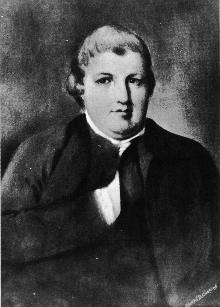
Thomas Stretch was an American clockmaker and a founder and first Governor of the Colony in Schuylkill, later known as The State in Schuylkill, or Schuylkill Fishing Company. In 1753 he erected the first clock at Independence Hall in Philadelphia, a large clock dial and masonry clock case at the west end of the structure.
Miers Fisher was a lawyer, legislator, philanthropist, and merchant from Philadelphia, Pennsylvania. He was imprisoned and exiled during the Revolutionary War because of his Quaker beliefs, and after the war served in the Pennsylvania House of Representatives.
The Quaker Party was a political party in the Pennsylvania Colony and later Commonwealth of Pennsylvania. They were affiliated with the Quakers, formally known as the Society of Friends. They dominated the Pennsylvania Assembly until the second half of the eighteenth century.
References
- ↑ Thayer, Theodore (1947). "The Quaker Party of Pennsylvania, 1755-1765". The Pennsylvania Magazine of History and Biography. 71 (1): 20. ISSN 0031-4587. JSTOR 20087883 . Retrieved 22 May 2021.
- 1 2 3 4 5 6 7 Adams, Christine; Censer, Jack Richard; Graham, Lisa Jane (1997). Visions and Revisions of Eighteenth-century France. Penn State Press. ISBN 978-0-271-01637-5.
- 1 2 3 4 5 Parsons, William T. (1969). "The Bloody Election of 1742". Pennsylvania History: A Journal of Mid-Atlantic Studies. 36 (3): 290–306. ISSN 0031-4528. JSTOR 27771792 . Retrieved 22 May 2021.
- 1 2 3 4 Klein, Philip S.; Hoogenboom, Ari Arthur (2010-11-01). History of Pennsylvania. Penn State Press. ISBN 978-0-271-03839-1.
- ↑ "Paxton Boys uprising | United States history | Britannica". www.britannica.com. Retrieved 2022-09-27.
- ↑ Olson, Lester C.; Finnegan, Cara A.; Hope, Diane S. (2008-03-20). Visual Rhetoric: A Reader in Communication and American Culture. SAGE. ISBN 978-1-4129-4919-4.
- ↑ "Founders Online: John Dickinson and Others: Protest against the Appointment of …". founders.archives.gov. Retrieved 2022-09-27.
- 1 2 3 4 5 6 7 Berry, Jefferson (January 2011). "The Schemes of Public Parties: William Allen, Benjamin Franklin and the College of Philadelphia, 1756" (PDF).
- 1 2 3 4 5 6 "History's Headlines: Mayhem was the name of the game in the bloody Pa. election of 1742". WFMZ.com. Retrieved 2022-09-27.
- 1 2 "Andrew Hamilton - PA House of Representatives". The official website for the Pennsylvania General Assembly. Retrieved 2022-09-27.
- ↑ Carter, Katherine D. (1980). "Isaac Norris II's Attack on Andrew Hamilton". The Pennsylvania Magazine of History and Biography. 104 (2): 139–161. ISSN 0031-4587. JSTOR 20091455.